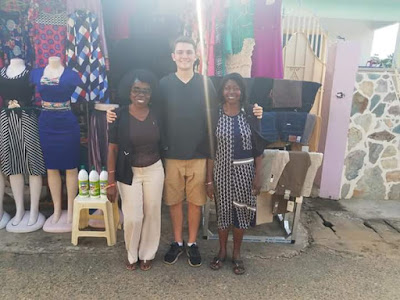The purpose of this post is just to give a little more information regarding Unite For Sight and to describe what my typical day is like as a volunteer working in Ghana. Unite For Sight is a non-profit organization founded in 2000. They work with local eye clinics in India, Honduras, and Ghana to provide quality eye care to some of the world's poorest populations. Over the last 20 years they have provided care to over 2,700,000 people and have funded over 100,000 sight-restoring surgeries. They work with local eye clinics and medical professionals to ensure that the care being provided is sustainable.


Most days we wake up by 6 or 6:30am and we are ready to leave by 8am. Breakfast is provided by our hotel and usually consists of toast with some Milo (a hot chocolate-like drink). The team from the eye clinic we are working with for the week will come and pick us up. Some weeks we have as many as 12 people, including volunteers, optometrists, ophthalmic nurses, and drivers, stuffed into one van. There is really no better way to bond than being squished together on a bench. We drive on average about two hours to the village or town we have an outreach in for the day. If we are going somewhere particularly far we might find a hotel around the area. For outreaches we almost always work in church buildings belonging to a variety of faiths. Some of the churches we have worked in were built over a century ago.
 |
| On the road! |
 |
| One of my favorite churches we have worked in. It was an old Methodist church built on a hill in Cape Coast. |
Usually, when we arrive we find anywhere from 20 to 200 people waiting for us. Local coordinators for Unite For Sight are in charge of organizing the eye screenings and announcing them to the community. After arriving we get everything set up while one of the optometrists or nurses gives an explanation to the crowd of who we are and what we are doing.






I have helped with visual acuity testing on most of my outreaches. We set up a chair six meters away from a eye chart and check how far down the chart an individual can see with each eye. This might seem simple, but when the person you are testing doesn't speak English or starts trying to peek with their other eye it can get a little bit challenging. After the acuity test we send them to sit in a line to see one of the optometrists or nurses who will check their eyes. If they need medication or glasses they will then go to the dispensing table where they can get it. If they need to have a surgery done they can speak to the local coordinator who can help them make arrangements to travel to Accra on a designated day.
 |
| Our van is multi-purpose. |
 |
| Volunteers helping out with visual acuity tests. |
 |
| If someone can't see the chart we check if they can see how many fingers we are holding up from various distances. |
We usually arrive back home sometime between 6 and 8pm and find something to eat. We have some great chopbars (places selling food along the street) close by. We eat a lot of rice as well as some delicious Ghanaian dishes. We spend the rest of our night playing games, doing homework, or washing clothes. I usually have no trouble falling asleep at night. The days can be long, but they also seem to fly by. I love getting to spend day after day getting to know so many of the dear people of Ghana!
 |
Fufu in groundnut soup with chicken. Yum!
|

















Comments
Post a Comment